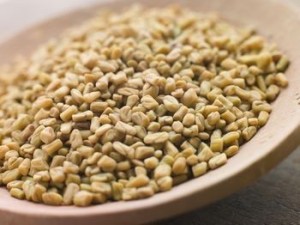Fenugreek is a plant. The seeds can be used to make medicine. Fenugreek can be used for many conditions.
Contents
Uses
- Fenugreek has also been used to alleviate blood sugar metabolism problems like diabetes.
- Fenugreek tea has also been recommended to new mothers to enhance milk production. Though evidence for this claim is limited, it seems to be accurate. One human study has shown that fenugreek supplementation can also enhance Testosterone, but since additional evidence shows conflicting results, further evidence is needed to confirm this effect.
Benefits
-
Increased Libido
The website Home Remedies Web reports that diosgenin is a compound that has properties comparable to the primary female sex hormone estrogen. Because it has properties similar to estrogen, fenugreek is hailed for enhancing libido. Furthermore, the herb is believed to be a natural hormone replacement therapy for women experiencing menopause.
-
Increased Breast Size
The website Herb Wisdom notes fenugreek may help promote the growth of new breast cells and increase the size and fullness of your bust. New breast cells can reportedly be created from the hormonal effects of diosgenin. For optimum enlargement of your breasts, Home Remedies Web suggests taking three grams of fenugreek daily.
-
Problems with Reproduction
With your doctor’s consent, fenugreek may used to stimulate uterine contractions and induce childbirth.
-
Skin problems
The website Nutritional Supplement Educational Centre lauds fenugreek for its ability to soothe and heal minor skin wounds and infections. Studies have indicated fenugreek is a particularly powerful topical treatment for skin ailments like abscesses, boils, burns, eczema and gout. To use fenugreek as a lotion, grind the herb into a powder and concoct it with warm water. Subsequently, soak a cloth with the mixture and apply it to the affected region.
-
Lower cholesterol
Home Remedies Web cites studies that have shown individuals who consumed two ounces of fenugreek daily over a span of 24 weeks significantly lowered their cholesterol levels and dramatically lessened their risk of suffering a heart attack. You can ingest two ounces of fenugreek by sprinkling the herb in powder form over food or by taking the herb in capsule form.
-
Treating diabetes
Fenugreek may be an efficient method to treat both type one and two diabetes. Nutritional Supplement Educational Centre notes a study conducted in India that discovered taking an ounce of fenugreek daily can diminish blood glucose levels. Prior to consuming the herb to treat diabetes, consult with a doctor or physician to ensure it is safe for you to take.
-
Digestive aid
Fenugreek is respected for its digestive aid benefits. Fenugreek seeds possess a significant amount of mucilage, which is a substance akin to an adhesive. Mucilage battles gastrointestinal inflammation by coating the lining of your stomach and intestines. The website Vita Wise suggests using this powerful herb to combat indigestion, dyspepsia, stomach ulcers, diarrhea and gastrointestinal spasms. You should ideally sprinkle one tablespoon of fenugreek onto your food or ingest a tablespoon of the herb with water or juice prior to eating.
-
Weight loss
Fenugreek is plentiful in soluble fiber. Soluble fiber is acclaimed for promoting weight loss because it causes your digestive tract to enlarge. An expanded digestive tract can make you feel full and successfully control your appetite.
Cautions
- Please see: http://nutrawiki.org/fenugreek/
Interactions
- Please see: http://nutrawiki.org/fenugreek/
Other names
Alholva, Bird’s Foot, Bockshornklee, Bockshornsame, Chandrika, Egypt Fenugreek, Fenogreco, Fenugrec, Foenugraeci Semen, Foenugreek, Greek Clover, Greek Hay, Greek Hay Seed, Hu Lu Ba, Medhika, Methi, Methika, Sénégrain, Sénégré, Trigonella, Trigonella Foenum, Trigonella foenum-graecum, Trigonella foenugraecum, Trigonelle, Woo Lu Bar
References
Source: Live strong, http://www.livestrong.com/article/241344-benefits-of-fenugreek-extract/
Examine.com, http://examine.com/supplements/fenugreek/

